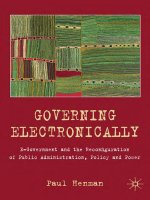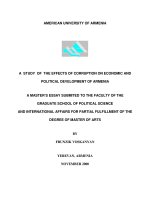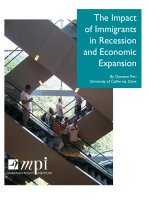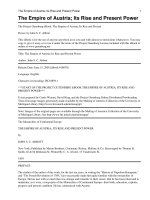the politics of decentralization forests, power, and people
Bạn đang xem bản rút gọn của tài liệu. Xem và tải ngay bản đầy đủ của tài liệu tại đây (2.44 MB, 332 trang )
The Politics of Decentralization
Forests, People and Power
Edited by
Carol J. Pierce Colfer and Doris Capistrano
London • Sterling, VA
2723 J&J Decentralization 27/4/05 4:07 pm Page i
To those whose voices have not yet been heard.
First published by Earthscan in the UK and USA in 2005
Copyright © Center for International Forestry Research (CIFOR), 2005
All rights reserved
ISBN: 1-84407-205-3 hardback
Typesetting by Fish Books
Printed and bound in the UK by Cromwell Press, Trowbridge
Cover design by Susanne Harris
For a full list of publications please contact:
Earthscan
8–12 Camden High Street
London, NW1 0JH, UK
Tel: +44 (0)20 7387 8558
Fax: +44 (0)20 7387 8998
Email:
Web: www.earthscan.co.uk
22883 Quicksilver Drive, Sterling, VA 20166-2012, USA
Earthscan is an imprint of James and James (Science Publishers) Ltd and publishes in
association with the International Institute for Environment and Development
A catalogue record for this book is available from the British Library
Library of Congress Cataloging-in-Publication Data has been applied for
Printed on elemental chlorine-free paper
2723 J&J Decentralization 27/4/05 4:07 pm Page ii
Contents
List of Contributors v
Foreword ix
Preface xi
Acknowledgements xii
List of Acronyms and Abbreviations xiii
Introduction 1
Jürgen Blaser, Christian Küchli, Carol J. Pierce Colfer
and Doris Capistrano
PART I THEMES IN DECENTRALIZATION 11
1 Forest Governance in Federal Systems: An Overview
of Experiences and Implications for Decentralization 13
Hans M. Gregersen, Arnoldo Contreras-Hermosilla,
Andy White and Lauren Phillips
2 Democratic Decentralization in the Forestry Sector:
Lessons Learned from Africa, Asia and Latin America 32
Anne M. Larson
3 Paths and Pitfalls of Decentralization for Sustainable Forest
Management: Experiences of the Asia Pacific Region 63
Ian Ferguson and Cherukat Chandrasekharan
4 Choosing Representation: Institutions and Powers for
Decentralized Natural Resources Management 86
Jesse C. Ribot
5 The Experience of the Food and Agriculture Organization
with Decentralization in the Forest Sector 107
Merilio G. Morell
6 Implications for Biodiversity Conservation of
Decentralized Forest Resources Management 121
Jeffrey Sayer, Christopher Elliott, Edmond Barrow, Steve Gretzinger,
Stewart Maginnis, Thomas McShane and Gill Shepherd
2723 J&J Decentralization 27/4/05 4:07 pm Page iii
PART II COUNTRY CASES 139
7 Decentralization of the Forestry Sector: Indonesia’s Experience 141
Wandojo Siswanto and Wahjudi Wardojo
8 Forests and Decentralization in Switzerland: A Sampling 152
Christian Küchli and Jürgen Blaser
9 Decentralization of Forest Management in Bolivia:
Who Benefits and Why? 166
Pablo Pacheco
10 Decentralization and Forest Management in Uganda 184
Steve Amooti Nsita
11 Decentralization of Federal Forestry Systems in Ghana 196
Oppon Sasu
12 The Push-Me, Pull-You of Forest Devolution in Scotland 212
Bill Ritchie and Mandy Haggith
13 Main Features of Russia’s Forest Management System 229
Natalia V. Malysheva
14 Forest Resources Decision-Making in the US 238
Gerald A. Rose with Douglas W. MacCleery, Ted L. Lorensen,
Gary Lettman, David C. Zumeta, Mike Carroll, Timothy C. Boyce
and Bruce Springer
PART III COMMUNITY VOICES 253
15 Decentralized Natural Resources Management in the
Chiredzi District of Zimbabwe: Voices from the Ground 255
Steven Hlambela and Witness Kozanayi
16 Decentralizing Protected Area Management at Mount Kitanglad 269
Adolino L. Saway Alyas Datu Makapukaw
and Felix S. Mirasol Jr.
17 State, Forest and Community: Decentralization of
Forest Administration in Guatemala 282
Silvel Elías and Hannah Wittman
18 Decentralization: Issues, Lessons and Reflections 296
Doris Capistrano and Carol J. Pierce Colfer
Index 315
iv The Politics of Decentralization
2723 J&J Decentralization 27/4/05 4:07 pm Page iv
List of Contributors
Steve Amooti Nsita () is a coordinator, Natural Forest
Management, National Forestry Authority, PO Box 70863 Kampala,
Uganda.
Edmond Barrow is a forest officer, World Conservation Union (IUCN)
Regional Office, Nairobi.
Jürgen Blaser () is with Intercooperation, an
organization for development and cooperation, Bern, Switzerland.
Timothy C. Boyce is a state forester in Alabama.
Doris Capistrano () is director, Forests and
Governance Programme, Center for International Forestry Research
(CIFOR), Bogor, Indonesia.
Mike Carroll is director, Minnesota Department of Natural Resources,
Division of Forestry, Minnesota.
Cherukat Chandrasekharan is a consultant in Kerala, India.
Carol J. Pierce Colfer is a principal scientist, Forests and Governance
Programme, Center for International Forestry Research (CIFOR), Bogor,
Indonesia.
Arnoldo Contreras-Hermosilla is forest trends fellow, Forest Trends,
Washington, DC.
Silvel Elías () is a professor, Facultad de Agronomía,
Universidad de San Carlos, Guatemala, and a doctoral candidate,
University of Toulouse, France.
Christopher Elliott is director, Forest for Life Programme, World Wide
Fund for Nature (WWF) International, Gland, Switzerland.
2723 J&J Decentralization 27/4/05 4:07 pm Page v
Ian Ferguson () is emeritus professor, University of
Melbourne, Parkville, Victoria, Australia.
Hans M. Gregersen () is chair, Standing Panel on
Impact Assessment, Science Council, Consultative Group on International
Agricultural Research (CGIAR), Solvang, California.
Steve Gretzinger works for the World Wide Fund for Nature (WWF)
Regional Office for Central America, San José, Costa Rica.
Mandy Haggith () is a researcher with Worldforests,
95 Achmelvich, Lochinver, Sutherland, Scotland IV27 4JB.
Steven Hlambela is a resident of Chizvirizvi resettlement, Chiredzi district,
Zimbabwe.
Witness Kozanayi ( or
) is a consultant at the Center for
International Forestry Research (CIFOR), Eastern and Southern Africa
Regional Office, Harare, Zimbabwe.
Christian Küchli () works with the Swiss
Agency for the Environment, Forests and Landscape (BUWAL), Bern,
Switzerland.
Anne M. Larson () is a research associate, Center for
International Forestry Research (CIFOR), Managua, Nicaragua.
Gary Lettman is a principal economist, Oregon Department of Forestry,
Oregon.
Ted L. Lorensen is a senior staff member, Oregon Department of Forestry,
Oregon.
Douglas W. MacCleery is a senior policy analyst, US Department of
Agriculture (USDA) Forest Service, Washington, DC, US.
Stewart Maginnis is with the Forest Conservation Programme, World
Conservation Union (IUCN), Gland, Switzerland.
Natalia V. Malysheva () is head of department,
All-Russian Research Institute of Silviculture and Forestry Mechanization,
Ministry of Natural Resources of the Russian Federation, Moscow.
Thomas McShane works for World Wide Fund for Nature (WWF)
International, Gland, Switzerland.
vi The Politics of Decentralization
2723 J&J Decentralization 27/4/05 4:07 pm Page vi
Felix S. Mirasol Jr. () is protected area superintendent
of Mount Kitanglad Range Natural Park, Bukidnon, the Philippines.
Merilio G. Morell () is an institutions forestry
officer, Forestry and Institutions Service (FONP), Forestry Department,
United Nations Food and Agriculture Organization (FAO), Rome, Italy.
Pablo Pacheco ( ) is a PhD candidate, Clark University,
consultant to the Center for International Forestry Research (CIFOR),
Bogor, Indonesia, and research associate at the Institute of Environmental
Research for Amazônia (IPAM), Belem, Brazil.
Lauren Phillips is an intern, Forest Trends, Washington, DC.
Jesse C. Ribot (, ) is a fellow at the
Woodrow Wilson International Center for Scholars, Washington, DC, and
a senior associate in the Institutions and Governance Program, World
Resources Institute, 10 G Street, NE, Suite 800, Washington, DC 20002.
Bill Ritchie () is a researcher with Worldforests, 95
Achmelvich, Lochinver, Sutherland, Scotland IV27 4JB.
Gerald A. Rose () is a forest sustainability
consultant and former Director of Forest/State Forester in Minnesota.
Oppon Sasu () is a professional forester as well as a
project manager. He holds an MSc in forest management from the
University of Aberdeen and an MBA in project management from the
University of Ghana. Currently he is the Business Planning Manager of the
Forest Services Division of the Forestry Commission, Ghana, and Team
Leader for the High Forest Resource Project.
Adolino L. Saway Alyas Datu Makapukaw is chief, Council of Elders of
Mount Kitanglad Range Natural Park, Bukidnon, the Philippines.
Jeffrey Sayer () is a senior associate, World Wide Fund
for Nature (WWF) International, 1196 Gland, Switzerland.
Gill Shepherd is with the World Conservation Union (IUCN) Commission
on Ecosystem Management, London.
Bruce Springer is a forest management chief in Alabama.
Wandojo Siswanto () is secretary, Agency for
Forestry Planning, in the Indonesian Ministry of Forestry, Jakarta,
Indonesia.
List of Contributors vii
2723 J&J Decentralization 27/4/05 4:07 pm Page vii
Wahjudi Wardojo is secretary general of the Indonesian Ministry of
Forestry, Jakarta, Indonesia.
Andy White is a senior director, Policy and Market Analysis, Forest Trends,
Washington, DC.
Hannah Wittman is a PhD candidate, Department of Development
Sociology, Cornell University, Ithaca, New York, US.
David C. Zumeta is executive director, Minnesota Forest Resources
Council, Minnesota.
viii The Politics of Decentralization
2723 J&J Decentralization 27/4/05 4:07 pm Page viii
Foreword
Forests are profoundly local. Each one is unique and is adapted to its parti-
cular climate, soils and topography, and its history, as well as its use, depend
heavily upon its specific social and economic context. People with formal
forest management responsibilities are more successful in their endeavours if
they tailor their efforts to local conditions. It is hard to maintain forests long
without local support, and to achieve such support, communities must feel
they benefit.
At the same time, forests are truly global. The whole world benefits from
their rich biological and cultural diversity. Changes in forest size and
composition affect the global climate. Animals and plants move from one
place to another without regard for national borders. The same applies to the
smoke and haze from forest fires, the sedimentation of rivers and the lack of
drinking water caused by deforestation.
National governments bear the responsibility for the future of their forests.
Their citizens look to them to ensure that forest resources provide economic
growth and jobs, and to enforce the laws and protect the environment.
The challenge is to find a governance framework that can balance the
various local, national and global interests related to forests. Everyone agrees
that local groups should be allowed to come up with solutions that reflect
their own needs and circumstances; but regional, national and global con-
cerns must also be addressed.
This book grew out of an initiative by the governments of Indonesia and
Switzerland in the framework of the United Nations Forum on Forests to
promote a global dialogue about these issues. As part of that initiative, the
two governments co-sponsored a workshop in Interlaken, Switzerland,
called Decentralization, Federal Systems of Forestry and National Forest
Programmes. The Interlaken workshop was held on 27–30 April 2004, and
brought together more than 160 participants from 51 countries, representing
well over 70 per cent of the global forest surface.
The Interlaken workshop was designed to give high-level decision-
makers concerned with forests and other key stakeholders the opportunity to
share experiences about decentralization in the forest sector and to find out
about recent research on the topic. The outcome was a lively and interesting
discussion, the results of which are reflected in an official UN report.
2723 J&J Decentralization 27/4/05 4:07 pm Page ix
Now, with the publication of this book, we hope to share some of the
background information, experiences and conclusions with a wider
audience. Given the urgent need to find the right balance among local,
regional, national and global governance of forests, we thought it important
to make this material available to a much wider audience.
As the co-sponsors of this initiative, we would also like to give a special
word of thanks to the Center for International Forestry Research (CIFOR)
and Switzerland’s organization for development and cooperation, Inter-
cooperation, which have provided much of the technical and administrative
support for this initiative, to the Food and Agriculture Organization (FAO)
of the United Nations, the Program on Forests (PROFOR) at the World
Bank, the International Tropical Timber Organization (ITTO), the World
Wide Fund for Nature (WWF), the World Resources Institute (WRI), and the
governments of Canada, Japan, the UK and the US, which provided valuable
technical and financial support for the initiative. Our thanks also go to Carol
J. Pierce Colfer and Doris Capistrano of CIFOR for editing the volume.
If the Interlaken workshop made anything clear, it was that the search for
the appropriate balance between the authorities at different levels
responsible for forests is never-ending and constantly evolving. It probably
would not surprise anyone that Indonesia is grappling with difficult issues
after only a few years of a major process of decentralization. Yet,
Switzerland, which has been refining its decentralized approach for several
hundred years, is still trying to adjust the balance of powers to get things
right. All of us are in a process of constantly learning. This book is part of
that process; we hope it can help us move forward, for the sake of the world’s
forests and the people who depend upon them.
Wahjudi Wardojo, secretary general of the Ministry of Forestry of
Indonesia, and Philippe Roch, director, Swiss Agency for the Environment,
Forests and Landscape
March 2005
x The Politics of Decentralization
2723 J&J Decentralization 27/4/05 4:07 pm Page x
Preface
The idea for the Interlaken workshop on Decentralization, Federal Systems
of Forestry and National Forest Programmes was initiated by Jagmohan
Maini, then head and coordinator of the United Nations Forum on Forests
(UNFF) secretariat in New York. The governments of Indonesia and
Switzerland organized the workshop as a country-led initiative in support of
UNFF, and the plan was officially announced in 2002 at UNFF 2 (the second
formal meeting of UNFF). The workshop took place in Interlaken,
Switzerland, from 27–30 April 2004, the week preceding UNFF 4.
The workshop was co-hosted by the Center for International Forestry
Research (CIFOR) and co-sponsored by the governments of Brazil, Canada,
Ghana, Japan, the Russian Federation, Uganda, the UK and the US.
Technical or financial support was provided by the secretariat of UNFF, the
secretariat of the Convention on Biological Diversity (CBD), the National
Forest Programme Facility of the Food and Agriculture Organization (FAO),
the World Bank’s Program on Forests, the International Tropical Timber
Organization (ITTO), the World Wide Fund for Nature (WWF), the World
Resources Institute (WRI), the Swiss Agency for the Environment, Forests
and Landscape (BUWAL), the Swiss Development Cooperation (SDC), and
Intercooperation, a Swiss organization for development and cooperation,
which also took responsibility for the logistics for the workshop. A field day,
representing an integral programme element in the Interlaken workshop and
also described in this book, was organized by BUWAL in close cooperation
with the Forest Service of the canton of Berne.
About 160 people from 51 countries participated in the workshop,
representing 70 per cent of the global forest area. It is expected that the
initiative on decentralization in the forest sector, brought forward at
Interlaken, will further influence the debate on the links among sustainable
forest management, sustainable development goals, in general, and goals of
highest societal importance, such as poverty alleviation.
The chapters in this book are organized to reflect the three kinds of
experience shared at the workshop. The first part looks at decentralization
from a thematic perspective, examining such issues as biodiversity, democracy
and geography. The second part takes a national perspective examining
several country cases. The final section presents three community perspectives
on the experience of decentralization. In this way, we hoped to reflect the
diversity that characterizes decentralization experiences around the world,
and capture any generalizations that could be gleaned from this diversity.
2723 J&J Decentralization 27/4/05 4:07 pm Page xi
Acknowledgements
Our sincere and heartfelt thanks go to Rahayu Koesnadi, Linda Yuliani,
Luluk Suhada and Michael Hailu at CIFOR who have been particularly
important in keeping things moving along smoothly. We also want to thank
Olivia Vent and Sally Atwater who struggled with our various kinds of
English, and finally, Camille Adamson, Rob West and Michael Fell from
Earthscan, particularly for their willingness to work together to ensure a
timely production process.
2723 J&J Decentralization 27/4/05 4:07 pm Page xii
List of Acronyms and Abbreviations
AA appropriate authority
AMEDIKP Association of Eulalensis Women for Pixan – Komop
Development (Guatemala)
AMUNIC Nicaraguan Association of Municipal Goverments
BOLFOR Project for Sustainable Forest Management (Bolivia)
BOSCOM Communal Forests Office, National Forest Institute
(Guatemala)
BUWAL Swiss Agency for the Environment, Forests and Landscape
CAMPFIRE Communal Areas Management Programme for Indigenous
Resources (Zimbabwe)
CBD Convention on Biological Diversity
CBO community-based organization
CGIAR Consultative Group on International Agricultural Research
CIFOR Center for International Forestry Research
CIIFAD Cornell Institute for International Food and Development
CND National Commission for Decentralization
CONAP National Council for Protected Areas (Guatemala)
CPF Collaborative Partnership on Forests
CSM Cellule Stratégie et Méthode (Burkina Faso)
CSO civil society organization
DFID UK Department for International Development
EU European Union
FAO United Nations Food and Agriculture Organization
FLASCO Facultad Latinamericana de Ciencias Sociales (Guatemala)
FODECOM Fonds de Dévelopment des Communes (Burkina Faso)
G8 Group of 8 (industrialized countries, including the Russian
Federation)
GEF Global Environmental Facility
GPRS Ghana Poverty Reduction Strategy
GTZ German Agency for Technical Cooperation
ha hectare
IBAMA Brazil Environment and Natural Resources Institute
IDB International Development Bank
IFAD International Fund for Agricultural Development
IFF Intergovernmental Forum on Forests
IMF International Monetary Fund
INAB National Forest Institute (Guatemala)
2723 J&J Decentralization 27/4/05 4:07 pm Page xiii
IPAM Institute of Environmental Research for Amazônia
IPF Intergovernmental Panel on Forests
IPRA Indigenous Peoples Rights Act (the Philippines)
ITTO International Tropical Timber Organization
IUCN World Conservation Union
JFM joint forest management
km kilometre
LASA Latin American Studies Association
m metre
MARN Ministry of the Environment and Natural Resources
(Guatemala)
MDG Millennium Development Goal
MIRNA Integrated Management of Natural Resources in the Western
Highlands project
MPR People’s Consultative Assembly (Indonesia)
NGO non-governmental organization
NIPAS National Integrated Protected Area Systems Act (Philippines)
OECD Organisation for Economic Co-operation and Development
PARPA Prioritization of Strategic Areas in the Western Highlands
project
PROFOR Forestry Programme of the World Bank
PVO private voluntary organization
RSPB Royal Society for the Protection of Birds
SAGEDEDOM Service d’Appui à la Gestion et au Dévelopment des
Communes (Burkino Faso)
SDC Swiss Agency for Development and Cooperation
Sida Swedish International Development Cooperation Agency
SRA social responsibility agreement
TREASURE Timber, Recreation, Environment, Aesthetics from a
Sustained Usable Resource programme
UCA Central American University
UK United Kingdom
UN United Nations
UNCD United Nations Capital Development Fund
UNDCP United Nations International Drug Control Program
(Bolivia)
UNDP United Nations Development Programme
UNFCCC United Nations Framework Convention on Climate Change
UNFF United Nations Forum on Forests
US United States
USAID US Agency for International Development
USDA US Department of Agriculture
USSR Union of Soviet Socialist Republics
WRI World Resources Institute
WWF World Wide Fund for Nature
Z$ Zimbabwean dollars
xiv The Politics of Decentralization
2723 J&J Decentralization 27/4/05 4:07 pm Page xiv
Introduction
Jürgen Blaser, Christian Küchli, Carol J. Pierce Colfer
and Doris Capistrano
BACKGROUND TO A GLOBAL EXCHANGE
Decentralization processes are taking place in more than 60 countries
worldwide. These processes vary by sector, by the discretionary powers
transferred to lower levels of governance, by the design and implementation
of fiscal and other financial aspects and by degree of social responsibility.
These processes are of central importance in political and economic change
in all sectors of the economy, including the forest sector.
A few years ago, forestry decentralization was a non-issue for many
countries. In the proposals for action of the Intergovernmental Panel on
Forests (IPF, 1995–1997) and the Intergovernmental Forum on Forests (IFF,
1997–2000), decentralization is not explicitly mentioned, and it is only
indirectly present in the recommendations on participation. Decen-
tralization has become a theme in forestry only since substantial political
changes have taken place in many countries. As a matter of fact, governance
– of which decentralization is one of the most visible elements today – is a
crucial issue in sustainable forest management. It is the quality of
governance that may ultimately determine the fate of forest resources in all
their aspects – economic, social and ecological.
Important changes in approaches to forests and people have led to
remarkable gains in the application of good governance principles. The
development of an international forest regime through the United Nations
Forum on Forests (UNFF) and the work of the members of the
Collaborative Partnership on Forests (CPF), particularly the Food and Agri-
culture Organization (FAO), International Tropical Timber Organization
(ITTO) and the Center for International Forestry Research (CIFOR), with
the World Bank in the driver’s seat, have undoubtedly contributed to these
changes. This international forest regime has provided a much-needed
impetus for a re-examination of concepts on forest and people interactions,
and has facilitated policy change in many countries. In many cases, it has
helped to create legitimate spaces and recognition for local initiatives and
longstanding experimentation on the ground. The combination of locally
driven processes in concert with this international forest regime has led to
2723 J&J Decentralization 27/4/05 4:07 pm Page 1
significant changes in forest governance worldwide. For example:
• National forest programmes have become the focal point of the UNFF,
placing the discussion of better forest governance at the country level.
• Criteria and indicators for sustainable forest management have been
developed and will help to improve the monitoring of forest management.
• The advantages of linking buyers and sellers through the promotion of
specific market mechanisms have been recognized.
• The gap between environmental organizations and those focusing on
poverty reduction is, in some cases, narrowing.
• Multi-stakeholder involvement, debate and consultation have become
the norm and have helped to increase transparency and accountability.
• Forest law enforcement and governance initiatives, as promoted by the
World Bank in Asia and Africa, have opened the debate on illegal logging
and associated trade and corruption – themes that had been excluded
from any substantial discussion of sustainable forest management.
• Numerous countries have attempted to reorient forest management by
promoting greater decentralization and devolution to local people.
The decentralization processes occurring around the world have achieved
momentum. Local and regional perspectives and agendas are increasingly
informing and enriching forest-related discussions at the global scale.
However, more is required to build local involvement in the global dialogue.
Reaching global goals pertaining to both forest management and human
well-being requires policies that are more relevant locally, as well as greater
institutional capacity at both national and sub-national levels.
The Interlaken workshop Decentralization, Federal Systems of Forestry
and National Forest Programmes, was therefore a very timely event given the
sequence of actions undertaken over the past few years to secure conser-
vation and sustainable management of forest resources. Decentralization is a
cross-cutting issue, relevant to all the different aspects of sustainable forest
management, which links sustainability objectives at the local level with
broad global goals as defined in the UN Millennium Development Goals
(MDGs).
We hope that the contributions made at the Interlaken workshop will
stimulate further work at this cutting edge of policy, as well as greater
connections between such efforts and broader development concerns. Inter-
governmental global processes such as the UNFF can play a critical role, not
only in shaping the global agenda, but also in facilitating and supporting the
search for appropriate local solutions through local initiatives. Rio 1992 has
taught us to think globally; Interlaken is a point of departure to learn how
to act locally.
2 The Politics of Decentralization
2723 J&J Decentralization 27/4/05 4:07 pm Page 2
THE INTERLAKEN WORKSHOP AND ITS PARTICIPANTS
The objectives of the Interlaken workshop were as follows:
• to analyse the implications of decentralization of forest management for
the development of national forest programmes and to identify strategies
that would allow such programmes to effectively address this issue;
• to share the experience of countries that have decentralized their forestry
systems with countries currently undergoing rapid processes of
decentralization, including those in transitional phases;
• to derive the lessons learned from countries that have implemented
decentralization for use, where suitable, in other countries;
• to prepare reflections and proposals for the consideration of the UN
Forum on Forests related to decentralization, centralized systems of
forestry and their implications for national forest programmes.
About 160 people from 51 countries participated in the workshop,
representing 70 per cent of the global forest area. Approximately 75 per cent
of the participants came from developing countries and countries in economic
transition; 32 participants came from non-governmental organizations
(NGOs) and 32 from private-sector organizations. The Interlaken workshop
was an expert meeting, and participants expressed their views in their
personal capacities, not as country representatives or representatives of
specific institutions.
Because the intent of the workshop was to share ideas and experience
and contribute to our global understanding of the processes related to
decentralization, the workshop was divided into formal presentations,
facilitated discussions on pre-selected topics, field trips (discussed in Chapter
8) and working groups. The formal presentations ranged from thematic
discussions of decentralization, to surveys of regions or governance types, to
country-specific analyses. The decentralization implications at various scales
were also addressed, with presentations from participants representing
international, national, sub-national and local levels.
The presentations revealed substantial variation across the globe in the
history of governance approaches, in the extent and depth of people’s parti-
cipation, and in the balance of power among different governmental levels.
Although some fascinating patterns emerged, a recurring theme was the
uniqueness of each case and the importance of taking contextual factors into
account when considering new governance modes. These patterns and
variations will be explored in more detail in the following chapters, with part-
icular attention, in the final chapter of this book, to the lessons we can learn.
The working group sessions were organized around six main themes, and
their results were incorporated within the report submitted to UNFF:
• allocation of roles and responsibilities, and coordination at different
levels and across sectors;
Introduction 3
2723 J&J Decentralization 27/4/05 4:07 pm Page 3
• maintaining ecosystem functions, sustaining forest productivity and
appropriate application of knowledge and technology;
• policy, regulatory frameworks and equitable benefit-sharing;
• financial incentives, promoting investment and private-sector partner-
ship;
• participation, conflict and multi-stakeholder processes; and
• capacity-building and technical and information support.
Interlaken workshop participants were highly constructive and cooperative,
leading to an unusually candid sharing of experience and perspectives. The
field day, in which people could experience decentralization on the ground,
was instrumental. Overall, the workshop succeeded in defining issues and
approaches towards decentralization and in giving a broad overview of
existing and planned processes of decentralized forest management. This
book pulls together the central descriptive and analytical conclusions from
this fruitful sharing of global experience.
ORGANIZATION OF THE BOOK
The remainder of this book is organized into three main parts. The first,
focusing on thematic issues, raises important cross-cutting questions. The
second part offers case studies that convey some of the breadth of experience
of individual countries. The third, based on a community panel, provides a
‘bottom-up’ perspective, demonstrating how decentralization policies have
played out in rural communities in three countries – Guatemala, the
Philippines and Zimbabwe.
Part I begins with an overview of forest governance in federal systems by
Hans M. Gregersen, Arnoldo Contreras-Hermosilla, Andy White and Lauren
Phillips. A longer version of Chapter 1, which included a great deal of case
material, was published in draft form and used at the Interlaken workshop as
a discussion document. This chapter, of necessity, captures only the highlights
of the authors’ study.
The authors of Chapters 2 and 4, who have, in fact, worked together in
the past, focus on the important components of effective and benign demo-
cratic decentralization, though both argue that such a process has hardly been
attempted in any real sense. In Chapter 2, Anne M. Larson surveys
experiences in Africa, Asia and Latin America, focusing on lessons learned;
and in Chapter 4, Jesse Ribot is more prescriptive, analysing the mechanisms
and ‘excuses’ used by central governments to water down decentralization
efforts.
Chapter 3, by Ian Ferguson and Cherukat Chandrasekharan, switches to
a regional perspective, surveying the decentralization experience in Asia and
the Pacific. Like Larson and Ribot, these authors find many problems with
the implementation of decentralization; but they seem to favour a greater
role for central government in the overall balance among the levels.
4 The Politics of Decentralization
2723 J&J Decentralization 27/4/05 4:07 pm Page 4
Chapter 5 details the experience of the FAO with decentralization in the
forest sector. Merilio G. Morell outlines the various programmes that have
supported decentralization and then provides two case studies (Burkina Faso
and Mali) from which he draws a number of conclusions.
Chapter 6, written by Jeffery Sayer and colleagues Christopher Elliott,
Edmond Barrow, Steve Gretzinger, Stewart Maginnis, Thomas McShane and
Gill Shepherd, focuses on the implications of biodiversity conservation in
decentralized forest resource management. Although supporting the
reasoning behind decentralization, these authors warn of possible dangers to
biodiversity and resource conservation unless some important functions
remain in the hands of the state. They conclude by proposing some con-
ditions under which decentralization can favour biodiversity conservation.
The shortcomings of decentralization policies, in their implementation,
are clearly outlined in all of these contributions. Some authors argue for
slowing the pace in order to give governments and citizens a chance to adapt
to the new features of a decentralized approach; others suggest that local
governments and citizens will become adept at dealing with their new powers
only by using them. Although all see the potential value of decentralization,
some favour a stronger central role and others a stronger local role, in the
balance of power. Some show more faith in communities’ management
abilities, some have less.
Part II, the country cases, begins with Indonesia, the co-host of the
workshop together with Switzerland. Chapter 7, written by members of
Indonesia’s Ministry of Forestry, Wandojo Siswanto and Wahjudi Wardojo,
outlines the various laws and regulations that frame decentralization in
Indonesia, and discusses frankly the principal problems that have plagued
the process, as well as governmental efforts to solve them, in a country that
began formal decentralization only very recently.
Chapter 8 presents Switzerland’s decentralization experience through a
presentation and discussion of the four field trips undertaken during the
workshop. It is written by Christian Küchli and Jürgen Blaser, and presents
a historical perspective on relations among the various levels of governance,
as well as key factors instigating shifts in the balance of powers and respon-
sibilities from more decentralized to more centralized forms and back again.
In Chapter 9, Pablo Pacheco describes the decentralization process in
Bolivia, under way since the mid 1990s, which has focused on the devolution
of significant powers to municipalities. Bolivia has empowered indigenous
groups by returning their traditional territories to them, has empowered
private landowners by allowing them to develop management plans and log
their forests, and has empowered previously illegal loggers by legalizing
small, community-based logging companies. Although significant strides
have been made towards devolving powers both to communities and to
lower levels of the bureaucracy, serious problems – outlined clearly in this
chapter – remain.
Chapter 10, by Steve Amooti Nsita, describes the Ugandan situation.
This country has been through several cycles of decentralization and
Introduction 5
2723 J&J Decentralization 27/4/05 4:07 pm Page 5
recentralization, culminating most recently in another decentralization
phase. The fact that many of the problems reported in Indonesia mirror
those in Uganda does not augur well for a speedy resolution of their shared
problems, particularly regarding the balance of power between levels.
Ghana, described in Chapter 11 by Oppon Sasu, is unique among
developing countries in the longevity of its decentralized government, which
was first formally acknowledged in 1878. Like Uganda, however, Ghana has
gone through different phases. The current decentralization phase began in
1988, when local government was given additional powers, and was strength-
ened again in 2003 with a formal decentralization plan. A central problem in
Ghana is the unwillingness of central government agencies to relinquish
authority, as intended, to the district assemblies. This chapter includes serious
attention to the lessons learned in Ghana’s decentralization process.
Turning to Europe, in Chapter 12, Bill Ritchie and Mandy Haggith
examine the decentralization process in Scotland, which involved oscillation
between top-down and bottom-up pressures. The establishment of the
Scottish Parliament in 1999 and the transfer of control of Scotland’s forest
estate to the Scottish Executive were two top-down elements leading to
greater local control. For their part, local people’s organized efforts to gain
access to land and forests led to a land reform act that gives them the right
to own land, including woodlands, and to the establishment of more than
100 community woodland organizations.
In Chapter 13, Natalia V. Malysheva outlines Russia’s long history of
centralized forest management and its painful efforts to decentralize during
recent years. Malysheva, a member of the forest bureaucracy, looks at the
historical evidence and comes down firmly in favour of a strong central state
role in forest management, arguing for the importance of Russia’s forests to
the global community (over 25 per cent of the world’s standing volume of
timber is in Russia) and the threats posed by decentralization as implemented
to date.
Chapter 14, by Gerald A. Rose with Douglas W. MacCleery, Ted L.
Lorensen, Gary Lettman, David C. Zumeta, Mike Carroll, Timothy C. Boyce
and Bruce Springer, describes forest management in a country with a
longstanding form of federal government: the US. During the 20th century,
concerns over environmental stewardship led the federal government to
control many aspects of land management, including public forest managers’
dealings with local communities. Some states fall back on those laws and
regulations; others impose stricter standards. Colleagues Ted L. Lorensen,
Gary Lettman, David C. Zumeta, Mike Carroll, Timothy C. Boyce and Bruce
Springer describe the approaches taken in Oregon, Minnesota and Alabama.
The cases demonstrate serious problems with the implementation of
decentralization, but also, with one exception (Russia), a commitment to con-
tinue trying to make it work. Switzerland, whose decentralization history
started more than 150 years ago, experienced problems during the first
decades very similar to the ones that newly decentralized countries are
reporting. The long time to sort out conflicts and optimize the cooperation of
6 The Politics of Decentralization
2723 J&J Decentralization 27/4/05 4:07 pm Page 6
all the governance levels might be one reason that this country case study,
together with the Scottish experience and, perhaps, Bolivia, appears more
optimistic in an otherwise rather dismal record. Recurrent problems include
conflict over the division of authority and resources between the various levels
of government, problems controlling forest crime, historical oscillation
regarding preferred levels of decentralization, difficulties realizing the
empowerment of communities as intended by decentralization advocates and
unwillingness of central governments to relinquish control and resources to
lower levels of government.
The final part of this book is devoted to community voices. Each of the
first three chapters in Part III was written as a joint contribution by a
community member and a partner who helped with writing, language and
adjusting to the context of an international workshop. Our intent was to
make the presentation of community views to an international body of
policy-makers, scientists and bureaucrats as open and seamless as possible.
Steven Hlambela is a community leader in Zimbabwe’s Chiredzi District.
He was assisted by Witness Kozanayi, a junior researcher working for
CIFOR, who has experience in that community as well as others. Chapter 15
outlines this community’s experience in trying to implement a community-
inspired resettlement vision. After a series of difficulties, including internal
conflict, outsiders claiming resources, and disagreements and inaction by
government officials, the authors conclude that communities cannot ‘go it
alone’. Both bottom-up and top-down involvement will be necessary to
accomplish community goals.
Adolino L. Saway Alyas Datu Makapukaw is a tribal leader from the
Talaandig tribe in Mindanao (the Philippines) and Felix S. Mirasol Jr works
for the Philippine Department of Environment and Natural Resources in
Mindanao. Chapter 16 tells the story of their efforts to manage Mount
Kitanglad Natural Park cooperatively. Although there have been conflicts
and problems, the authors consider the decentralization process to be
proceeding well in the Philippines, and to have had a positive overall impact.
Silvel Elías is originally a community member from a Guatemalan village
but is currently a doctoral student at the University of Toulouse, France;
Hannah Wittman is a doctoral student from Cornell University. These authors
find serious problems with the decentralization process in Guatemala,
presented in Chapter 17. Conflicts abound between a government that has
traditionally ignored and abused indigenous rights, and communities intent
on defending their rights. In some cases, by shifting governmental regulation
to a more local level, decentralization actually causes a loss of indigenous
control over natural resources.
The community examples share the experience of conflict between
governmental entities and members of local communities, and among other
stakeholders as well. But the authors vary in the degree to which they
consider decentralization helpful. The Philippine authors, although acknow-
ledging some problems, are basically optimistic that this process is beneficial
and that problems can be ironed out; the Zimbabwe authors reluctantly
Introduction 7
2723 J&J Decentralization 27/4/05 4:07 pm Page 7
conclude that they need the help of the government; and the authors of the
Guatemalan case present conflict-ridden scenarios with the potential for
adverse effects on local communities. Clearly, decentralization is having
different impacts in different places.
The final chapter in this book, the conclusion, pulls together the import-
ant threads that emerged during the workshop and highlights interesting
differences.
This chapter concludes by summarizing important definitions pertaining
to the issues addressed in and used throughout this book. The definitions are
based on those developed by Hans M. Gregersen for the World Bank (see
www.worldbank.org/publicsector/decentralization/admindecen.htm).
TYPES OF DECENTRALIZATION
Political decentralization. Groups at different levels of government – central,
sub-national (meso) and local – are empowered to make decisions related to
what affects them.
Administrative decentralization. Different levels of government
administer resources and matters that have been delegated to them, generally
through a constitution. In terms of decentralization as a process of change,
and according to the level of transfer of responsibilities, it is useful to
distinguish between the following forms:
• Deconcentration redistributes decision-making authority and financial
and management responsibility within the central government; there is
no real transfer of authority between levels of government. Decon-
centration may involve only a shift of responsibilities from federal forest
service officials of the capital city to those stationed in provinces or
districts.
• Delegation transfers responsibilities and authority to semi-autonomous
entities that respond to the central government but are not totally
controlled by it. Public forestry corporations and, in some cases,
implementation units of some forestry projects – often donor supported
– are examples of this form of decentralization.
• Devolution transfers specific decision-making powers from one level of
government to another (from a lower level to a higher level of
government, in the special case of federations) or from government to
entities of the civil society. Regional or provincial governments, for
example, become semi-autonomous and administer forest resources
according to their own priorities and within clearly defined geographic
jurisdictions. Most political decentralization is associated with
devolution.
Fiscal decentralization. Previously concentrated powers to tax and generate
revenues are dispersed to other levels of government. For example, local
8 The Politics of Decentralization
2723 J&J Decentralization 27/4/05 4:07 pm Page 8
governments are given the power to raise and retain financial resources to
fulfill their responsibilities.
Market decentralization. Government privatizes or deregulates private
functions, as has happened in the New Zealand forest sector.
Introduction 9
2723 J&J Decentralization 27/4/05 4:07 pm Page 9









